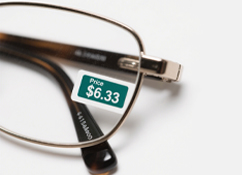Polycarbonate (PC) vs. Resin Eyeglass Lenses: Which Is Better for You?
Recently, after covering differences between specialized lenses (like Nikon Kontrol 2.0 and 3.0), a reader asked: “Is upgrading from PC to resin lenses really an improvement?” The short answer: It depends. Polycarbonate (PC) and resin lenses each have unique pros and cons—there’s no “one-size-fits-all” best option. The right choice depends on your prescription, lifestyle, budget, and priorities (like safety or thinness).
First, a quick note on pricing for specialized lenses (like Nikon Kontrol): The usual order flips here—PC lenses are relatively cheaper, while resin lenses cost more. PC lenses also scratch more easily in daily use. Below, we break down their general strengths, weaknesses, and who should choose each.
Polycarbonate (PC) Lenses: Pros & Cons
PC lenses are a popular choice for people who prioritize safety, comfort, and thinness—especially for strong prescriptions. Here’s what you need to know:
Pros
Lightweight & Comfortable: PC lenses are lighter than standard resin lenses, so they put less pressure on your nose bridge and ears. For people with high myopia (strong nearsightedness), this means avoiding the soreness that comes with heavy, thick lenses.
Extreme Impact Resistance: PC lenses are often called “bulletproof glass for eyes” because they’re nearly shatterproof. Even if you drop them or they get hit, they rarely break—way safer than resin or glass lenses for active use.
Built-In UV Protection: No extra coating needed—PC lenses block 100% of UVA and UVB rays. This protects your eyes from sun damage (like cataracts or macular degeneration) without added cost.
Thinner for Strong Prescriptions: With a refractive index of ~1.586 (higher than standard resin), PC lenses are thinner for the same prescription. This makes them more stylish (no “bottle-bottom” edges) and comfortable for people with high myopia or hyperopia.
Cons
Prone to Scratches: PC lenses have a soft surface—daily wear (like wiping with a rough cloth or bumping into objects) can leave scratches. You’ll need an anti-scratch coating to make them last (adds a small extra cost).
Color Distortion (Chromatic Aberration): PC lenses have a low “Abbe number” (a measure of how light bends through the lens). This can cause faint “rainbow fringes” around objects in bright light, which some people find distracting. It may take a week or two to adjust.
More Expensive Than Standard Resin: PC lenses cost more than basic resin lenses (think $50–$100 extra, depending on the prescription). The added cost is worth it for safety or thinness, but not if you’re on a tight budget.
Resin Lenses: Pros & Cons
Resin lenses (often called “plastic lenses” in the US, though PC is also a type of plastic) are the most common choice for casual users. They’re affordable and work well for mild prescriptions.
Pros
Excellent Value: Resin lenses have a mature manufacturing process, so they’re cheaper than PC lenses. They’re perfect if you want basic vision correction without overspending.
Moderate Impact Resistance: While not as tough as PC, resin lenses are still more shatterproof than glass. They can handle minor bumps (like dropping them on a carpet) without breaking—good for low-activity use.
Clear Vision (Great Light Transmittance): High-quality resin lenses let more light pass through (called “light transmittance”) than PC lenses. This means sharper, more true-to-life vision—no weird color tints or blurriness.
Cons
Also Prone to Scratches: Like PC, resin lenses have a soft surface. Wiping them with paper towels, napkins, or dirty cloths will scratch them, which reduces clarity over time. An anti-scratch coating is still a good idea.
Thicker for Strong Prescriptions: Standard resin (like CR-39, with a refractive index of ~1.498) is thicker than PC for the same prescription. For high myopia, this means bulkier, heavier lenses that can feel uncomfortable on your nose.
Less Safe for Active Use: Resin lenses can shatter if hit hard (e.g., during sports or a fall). They’re not ideal for kids, athletes, or anyone who spends a lot of time outdoors or moving around.
Who Should Choose PC Lenses vs. Resin Lenses?
Use this breakdown to match the lens to your lifestyle:
Choose PC Lenses If You Are…
A kid or teen: Kids are active (playgrounds, sports) and drop glasses often—PC’s shatterproof design keeps their eyes safe.
An athlete or fitness lover: Whether you play basketball, run trails, or lift weights, PC lenses can handle impacts without breaking.
Someone with high myopia/hyperopia: PC’s higher refractive index means thinner, lighter lenses—no more heavy, uncomfortable frames.
Outdoor-focused: PC’s built-in UV protection saves you from buying an extra coating, and its durability stands up to wind, dust, and bumps.
Note: If scratches are a major worry (e.g., you’re rough with glasses), opt for resin instead—just be careful with impacts.
Choose Resin Lenses If You Are…
A casual user: If you only wear glasses for reading, working at a desk, or driving occasionally (low activity), resin works perfectly.
On a budget: Resin is the cheapest option for basic vision correction—great if you need a backup pair or don’t want to spend much.
Sensitive to color distortion: If PC’s rainbow fringes bother you, resin’s higher Abbe number means clearer, more natural color vision.
Don’t Skip Professional Advice
Before choosing, talk to an ophthalmologist or optometrist. They’ll factor in:
Your prescription (e.g., is it mild enough for resin, or strong enough to need PC’s thinness?).
Your habits (e.g., do you play sports? Spend 8+ hours outdoors?).
Eye health (e.g., do you have dry eye or sensitivity to glare, which might affect lens choice?).
A pro can also recommend add-ons (like anti-scratch or anti-glare coatings) to make your lenses last longer and work better for you.
Final Thought
PC lenses win for safety, thinness, and active lifestyles—resin wins for budget and casual use. There’s no “upgrade” that’s better for everyone; it’s about what fits your needs. Whether you choose PC or resin, adding an anti-scratch coating is always a good idea to extend their life.
At the end of the day, the best lens is the one that lets you see clearly, feels comfortable, and fits your daily routine.











